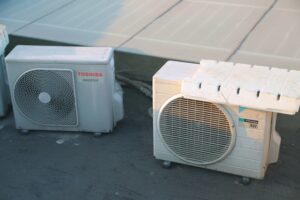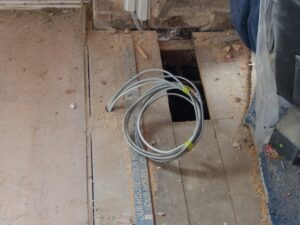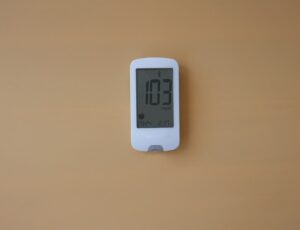Having a well-running HVAC system is important for keeping energy bills low and comfort high. If your system isn’t performing well, you might be wasting energy and money. HVAC diagnostics allow you to pinpoint exact issues for accurate repairs, saving you both time and resources.
When your system runs into problems, Excel Mechanical is here to help. We pride ourselves on providing top-notch HVAC and plumbing services, tailored to fit both your needs and budget. Our experts work hard to ensure you get a system that works perfectly for your space, whether it’s in your home or business.
Accurate diagnostics is key to avoiding unnecessary replacement parts and extended downtimes. By choosing Excel Mechanical, you gain the expertise of professionals dedicated to exceptional service and quality. We aim to deliver effective solutions that deliver real value, ensuring your HVAC system keeps your environment comfortable year-round.
In this blog, you will learn:
- The key components that make up your HVAC system and how they function.
- How accurate HVAC diagnostics can save you money and improve efficiency.
- Common HVAC issues and expert tips on maintaining your system’s longevity.
Let’s dive in!
Fundamentals of HVAC Systems
Understanding HVAC systems is crucial for accurate diagnostics and repairs. The key components, their functionality, and various types of equipment define how these systems work.
Components and Functionality
HVAC systems have several key parts that interact to control temperature, humidity, and air quality.
- Thermostats regulate when heating or cooling should start.
- The furnace provides heat using fuel or electricity.
- The heat exchanger transfers heat, and the evaporator coil cools air with refrigerant.
- Blowers circulate air through ducts while ductwork distributes it around your space.
- A condenser unit releases heat outside during cooling.
Regular check-ups on these parts ensure efficient operation and reduce breakdowns.
Common Types of HVAC Equipment
HVAC equipment varies to suit different needs.
- Split systems have separate units for heating and cooling.
- Packaged systems combine all components in one unit and are often used in smaller spaces.
- Heat pumps efficiently heat and cool homes by moving heat rather than generating it.
- Ductless systems provide heating and cooling to specific areas without ductwork, offering flexibility.
- Furnaces use fuel like gas or oil to heat air for distribution.
Each type serves unique purposes, and choosing the right one depends on space, climate, and budget. Our team can help you select and install the best system tailored to your needs and constraints.
Diagnosing HVAC Problems
Diagnosing HVAC issues accurately requires a clear process and the right tools. You need to follow structured steps for effective repair and maintenance, ensuring your system runs smoothly without unnecessary downtime.
Initial Assessment Procedures
Start by observing any obvious issues.
- Listen for unusual noises.
- Check for visible leaks or clogs.
- Confirm that the thermostat settings are correct.
- Make sure power connections are secure and there are no blown fuses.
- Next, inspect all register and vent openings to ensure they’re unobstructed.
It’s important to gather initial information by speaking with the homeowner or facility manager about specific problems they’ve noticed. This helps you understand any recurring problems or recent changes.
Effective communication can provide a critical context for further diagnostics.
Diagnostic Tools and Techniques
Using the right tools is crucial.
- A multimeter helps measure electrical inputs and outputs, ensuring circuit integrity.
- A refrigerant gauge is essential for checking system charge levels, while anemometers measure airflow to diagnose blockages or inefficiencies.
- Thermal cameras can detect hot or cold spots, revealing insulation or airflow problems.
For more advanced systems that provide real-time data and analytics, familiarize yourself with software-based diagnostic tools.
Interpreting Diagnostic Data
Understanding data collected from diagnostic tools is key.
Use multimeter readings to assess voltage and current levels, ensuring they match manufacturer specifications. Proper refrigerant levels are critical for efficiency and function.
Temperature readings should align with what the system’s design promises. Low airflow readings might indicate duct blockages or dirty filters needing replacement.
By accurately interpreting this data, you can ensure your HVAC system operates efficiently.
Repair Strategies for HVAC Systems
You must make smart choices about repairs and replacements to keep your HVAC system running efficiently. Troubleshooting helps identify and fix common issues, extending the lifespan of your unit.
Decision-Making for Repairs vs. Replacement
Knowing when to repair or replace an HVAC system can save money and improve comfort.
Consider the age of your system: if it’s over 15 years old, replacement might be more cost-effective in the long run. Assess energy usage and repair costs. A unit needing frequent, costly repairs likely needs replacement.
Replacement often brings energy savings. Newer models are more efficient and environmentally friendly.
Excel Mechanical offers a range of solutions to match needs and budgets, ensuring optimal performance. Our professional team provides insights into the best residential and commercial systems strategies.
Troubleshooting Common Issues
Common HVAC problems like poor airflow, strange noises, or inconsistent temperatures often stem from simple fixes.
- First, check your air filters. Dirty filters can hinder airflow and efficiency. Regular cleaning or replacement solves many issues.
- Thermostats are another common culprit. Ensure it’s working and set correctly.
- Listen for any unusual noises, as these can indicate mechanical problems.
- Refrigerant leaks lower cooling efficiency and need professional attention.
Our technicians strive for exceptional quality, ensuring your system operates smoothly. They provide great value by quickly diagnosing and correcting issues and maintaining comfort.
Accurate Repair Execution
Accurately executing HVAC repairs requires the right tools and a solid process to ensure the best results. Each repair step should be followed precisely to meet specific heating and cooling needs.
Precision Tools and Equipment
Using high-quality tools is essential for precise HVAC repairs.
Tools like digital multimeters, thermometers, and leak detectors help diagnose and fix problems accurately.
These tools allow you to measure electrical values, temperature differences, and refrigerant levels. This accuracy ensures that no detail is overlooked and that repairs are completed effectively.
Investing in advanced technologies improves the repair process and helps extend the system’s lifespan by protecting against unnecessary wear and tear. This makes the process not just accurate but also cost-effective.
Step-by-Step Repair Processes
A clear, step-by-step process is crucial for executing HVAC repairs accurately.
- First, identify the issue using diagnostic tools.
- Next, isolate and inspect the faulty parts to understand what needs fixing or replacing.
- Following this, perform the repair based on detailed guidelines, ensuring each part functions correctly. This method reduces errors and saves time by preventing the repetition of steps, leading to a quicker resolution.
Quality Control and Testing
Quality control ensures your HVAC system performs efficiently after repairs. Testing verifies that fixes are effective and meet standards.
Post-Repair Inspections
After repairs, a detailed inspection checks all components. This process includes evaluating parts for wear and ensuring connections are secure. Any potential future issues are noted. This step makes sure everything is in working order and safe.
Excel Mechanical stands out with its thorough inspections. Our team prioritizes quality, ensuring your HVAC system serves you reliably. Working closely with you, we tailor services to suit your needs and budget, guaranteeing satisfaction.
Performance Verification
Performance testing follows inspections.
Technicians assess system efficiency, verifying temperature regulation and airflow. Measurements confirm if energy consumption is optimal.
System Tests Table:
| Test Type | Purpose |
| Airflow Check | Ensures proper circulation |
| Temperature Test | Confirms thermostat accuracy |
Our commitment to value means you get precise solutions. Trusting experts ensures peak performance, saving costs in the long run.
Maintenance Tips for Longevity and Efficiency
Keeping your HVAC system in good shape is essential for longevity and efficiency. Regular maintenance activities can prevent more significant problems and costly repairs. Enhancing system performance can save energy and improve comfort.
Regular Maintenance Activities
Performing regular check-ups ensures your HVAC system runs smoothly.
- Depending on your usage and air quality, you should change air filters every 1-3 months. Clean filters keep air flowing freely and reduce strain on your system.
- Inspect your system for signs of wear, rust, or leaks. Check hoses and connections for damage.
- Clean the coils regularly to ensure efficient heat exchange. Dust and debris can gather over time, reducing efficiency.
- Schedule annual professional tune-ups. A trained technician can catch issues early and provide solutions tailored to your system.
This proactive approach prevents unexpected breakdowns and extends the life of your equipment.
Improving System Efficiency
To improve efficiency, ensure your thermostat settings match your schedule.
Avoid heating or cooling empty spaces if you’re away during the day. Consider a programmable or smart thermostat for easier management.
Seal any leaks in ductwork or around windows. Air leaks force your system to work harder, wasting energy. Simple fixes like weatherstripping can make a big difference.
Optimize your space with proper ventilation and insulation. Good insulation keeps temperatures stable, reducing your HVAC’s workload.
Choose quality services to meet your unique needs and budget. Our team ensures top performance for residential and commercial systems, prioritizing quality and value.
Safety Considerations in HVAC Repairs
Staying safe during HVAC repairs is essential. Understanding the necessary protective gear and being aware of potential risks can prevent accidents and protect you.
Personal Protective Equipment
When working on HVAC systems, personal protective equipment (PPE) is crucial.
Wear safety glasses to protect your eyes from debris or chemical splashes and gloves to shield your hands from sharp edges or hot surfaces. A dust mask or respirator is also essential to avoid inhaling harmful particles or fumes.
In addition, steel-toed boots can provide safety against heavy tools or equipment falls. Wearing protective clothing can prevent burns or cuts from sharp objects.
Ensuring you have the right gear significantly reduces the risk of injury.
Hazard Awareness and Mitigation
Understand the hazards that come with HVAC repairs to mitigate them effectively.
Be aware of electrical risks, such as live wires, and always shut off the power before starting your work. Recognize the dangers of refrigerant gases, which require careful handling and proper ventilation. Pay attention to moving parts that might cause injury, and always use tools correctly.
Our team is trained to identify and manage these risks effectively. We take pride in providing the best HVAC and plumbing services, ensuring your system meets your needs safely and efficiently.
Advancements in HVAC Diagnostics
In the world of HVAC systems, new technologies, and remote capabilities are changing how diagnostics are performed. These advancements lead to greater efficiency and more precise solutions for both repairs and maintenance.
Emerging Technologies
Emerging technologies in HVAC diagnostics have drastically improved how issues are identified and addressed.
- Smart sensors now monitor system performance in real-time, detecting faults and inefficiencies that might go unnoticed by traditional methods. These sensors alert technicians to specific problems, allowing for targeted inspections and faster resolution.
- In addition, machine learning algorithms analyze data collected by these sensors to predict potential failures. This proactive approach can prevent problems before they occur, saving time and money.
- Implementing advanced diagnostic software also supports more accurate assessments, providing detailed insights that help technicians make informed decisions about repairs or upgrades.
Innovations in Remote Diagnostics
Remote diagnostics is transforming HVAC service, enabling technicians to assess systems without being on-site.
This innovation uses cloud-based platforms to access real-time data from smart devices installed in HVAC units. Through these platforms, technicians can evaluate performance metrics, detect anomalies, and adjust settings remotely to optimize system operation.
These capabilities enhance service efficiency, reducing the need for unnecessary visits and lowering homeowners’ costs. By selecting our expert services, you benefit from cutting-edge technology and a commitment to exceptional quality.
We provide both residential and commercial clients with best-in-class HVAC and plumbing solutions.
Environmental and Regulatory Compliance
Following environmental and regulatory guidelines in HVAC work is essential. This helps to reduce harmful environmental effects and ensures safety. Adopting eco-friendly practices that minimize waste and save energy is crucial when complying with regulations.
Eco-Friendly Practices
Using eco-friendly HVAC methods can greatly benefit the environment and your business. Options like energy-efficient systems and smart thermostats help reduce energy consumption, and proper maintenance prevents leaks of harmful refrigerants.
Choosing recyclable materials and minimizing waste can further lessen the impact. Excel Mechanical stands out in this area, offering systems designed to be both efficient and sustainable, fitting your budget while prioritizing environmental health.
Our focus on quality ensures that installations meet residential and commercial needs, providing value for every client.
Frequently Asked Questions
When your HVAC system isn’t working as it should, it’s natural to have questions. The right answers can help you maintain your system efficiently and avoid costly mistakes. We’ve gathered the most common inquiries we receive to help you understand HVAC diagnostics, repairs, and maintenance a little better. Let’s dive in!
How much does a typical HVAC diagnostic test cost?
The cost of an HVAC diagnostic test can vary. Typically, you might expect to pay between $75 and $150. Prices can depend on your location and the complexity of the system.
What are the most effective tools for HVAC diagnostics?
Thermometers, multimeters, and refrigerant gauges are essential. These tools help accurately measure temperature, electrical currents, and refrigerant levels.
What are the common steps involved in diagnosing an HVAC issue?
First, a visual inspection is performed. Then, technicians test the electrical components and check the refrigerant levels. Lastly, they evaluate airflow and thermostat settings.
How can I tell if my HVAC technician has done a thorough diagnostic check?
Ensure they perform both visual and technical inspections. Ask if they checked all electrical components, refrigerant levels, and airflow. A detailed report afterward can confirm thoroughness.
What factors can affect the accuracy of HVAC diagnostics?
Equipment age and condition can impact diagnostics. Incorrect tool use or lack of technician expertise can lead to inaccurate results.
How often should a diagnostic be performed on an HVAC system for optimal performance?
Regular diagnostics can maintain performance. If you notice performance issues, it’s advisable to have a check annually or sooner.




